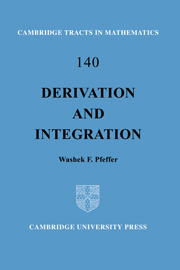5 - Integration
Published online by Cambridge University Press: 05 July 2014
Summary
For a locally BV set E, let R(E) := D[CH*(E))}. It follows from Theorem 3.6.6 the derivation D: CH*(E) → R(E) is bijective, and we shall investigate its inverse IE: R(E) → CH*(E). We show that IE, which has properties analogous to those of the indefinite Lebesgue integral, can be applied to partial derivatives of pointwise Lipschitz functions, and we prove unrestricted versions of the Gauss-Green and Stokes theorems. We also show that an averaging process akin to the classical Riemann integral provides a direct definition of IE.
The R-integral
In this section we define the R-integral and prove some of its basic properties; most of them follow readily from the corresponding properties of AC* charges established in Section 3.6.
Definition 5.1.1. Let E be a locally BV set. A function f defined on E is called R-integrable in E if there is an F ∈ CH*(E), called the indefinite R-integral of f, such that DF(x) = f(x) for almost all x ∈ E.
The family of all R-integrable functions in a locally BV set E is denoted by R(E). It follows from Theorem 3.6.6 that the indefinite R-integral F of a function f ∈ R(E) is uniquely determined by f, and we denote it by (R) ∫ f dLm or (R) ∫ f(x) dx.
Information
- Type
- Chapter
- Information
- Derivation and Integration , pp. 186 - 228Publisher: Cambridge University PressPrint publication year: 2001
